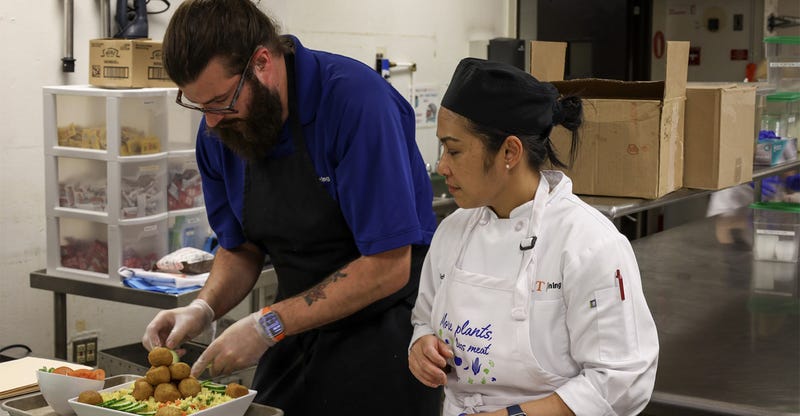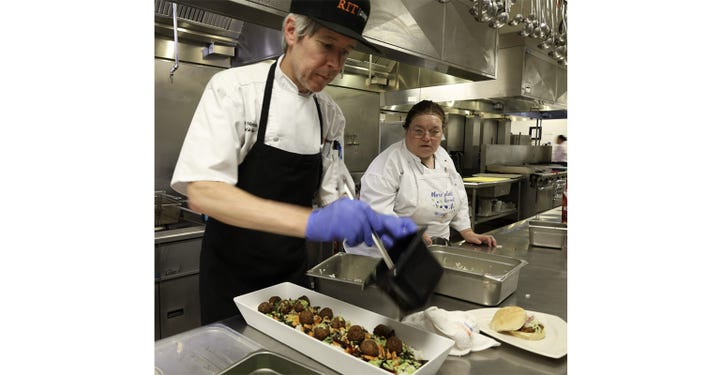Don't say vegan: Food service adopting more plant-based meals
In response to health concerns and consumer demand, food service providers are providing more animal-free foods. Find out how to transition.
August 3, 2023

It's not a secret: Food service operations across the United States are moving toward more plant-based, vegan offerings.
"Where I hope it goes is less of the 'V' word," says Dustin Peterson, Rochester Institute of Technology's director of operations for retail and partnerships at RIT Dining. "Instead of being vegan or plant-based, I just want it to be good food and leave it at that."
From ballparks to hospitals and universities, many food service locations are switching.
Earlier this year, universities like Rochester Institute of Technology, which has approximately 19,000 students, committed to offering 50% plant-based entrees in its four campus restaurants by the end of 2025. Backed by New York City Mayor Eric Adams' plant-forward movement, NYC Health + Hospitals now offers plant-based, vegan dishes at all 11 public hospitals and projects it will serve 850,000 plant-based meals by the end of 2023.
"For upcoming generations, this isn't new to them," Peterson says. "It's something they grew up with. Going forward, vegan and plant-based is going to become the new chicken tenders, and you've got to have it in your dining programs."
Many food service operations are turning to protein and high-fiber ingredients such as chickpea flour, soy, tempeh, tofu, lentils and kidney, pinto and black beans. Some have stopped serving processed meats, now considered a Class 1 carcinogen by the World Health Organization for its link to cancer.
There's plenty of evidence to support how a plant-based diet lowers the risk of developing diabetes, cardiac disease and obesity, says Samantha Morgenstern, client executive for client services at New York City Health + Hospitals with Sodexo.
"There's certainly an interest not only for health reasons but for the health of the environment," Morgenstern says. "We're at that point, where we need to think about what we're putting in our bodies and how that's also affecting the climate."
Anna Herby, a registered dietician and nutrition education specialist for the Physicians Committee for Responsible Medicine, a nonprofit advocacy organization that promotes plant-based diet as preventive medicine, echoes that sentiment.
"We're seeing a lot of the younger generation, out of concern for the environment and awareness of the health benefits, make the switch," Herby says.
But doctors must learn to think about food as medicine.
"If someone comes in with heart disease or diabetes, we want doctors to be able to talk about what a patient should be eating," Herby says. "Unfortunately, a lot of times it's just straight to the medication rather than any talk about dietary changes."

Tips for food service providers
Make incremental changes. "Don't be afraid to start small," Morgenstern says. "It doesn't have to be all or nothing at the beginning. Start with one meal and then expand," she says.
Get feedback. Collect data from the beginning, Morgenstern says, to track outcomes and show progression.
"Before putting a dish on a menu, we trial it as a special," she says. The dish is served at one meal for one day.
Right after they finish their meal, patients are asked for feedback, in-person, to get an honest opinion, Morgenstern says. If 80% of the polled patients don't give positive feedback, the meal won't put it on the menu, she says.
"Even if we think a dish looks good and tastes good, if it doesn't satisfy our patients, what's the point?"
Partner with the Humane Society. To help with the transition to more plant-based, vegan offerings, Herlan Manurung, Rochester of Technology's corporate executive chef and associate director of RIT Dining, partnered with the Humane Society of the United States.
During a two-day training last summer, chefs from across campus gathered in one kitchen and worked with the Humane Society on recipe demos. People were invited to test the food, and the recipes were then used to develop the plant-based menu.
Educate the public. Label dishes, use videos and menu boards so customers and patients understand what they are eating and how to eat it.
Be strategic about the placement of plant-based options. "Now, when we're setting the line, we put the vegan option first, then the sides and a meat protein at the end," Peterson says. "It draws more attention to the healthier plant-based options."
Use a recipe database. Physicians Committee for Responsible Medicine offers a vegan starter kit on its website. Its Universal Meals program goes a step further with plant-based, vegan recipes that are free of the top nine allergens including gluten, nuts, soy and sesame. One of the most popular recipes is a cauliflower and chickpea masala.
Avoid the "V word." "All of our entrees are vegan, but we don't use the terminology," Morgenstern says. "We use plant-based."
Some of that is a change in mindset, Peterson says.
"Eight or nine years ago, all you heard about was tofu when you needed to get a vegan option," Peterson says. That's dramatically changed with the amount of substitute proteins.
"It doesn't have to be tofu or an Impossible Burger," Peterson says.

Cater to the populations being served. Offering culturally diverse, plant-based meals is important, Morgenstern says, if you want a diverse patient population to try new plant-based dishes.
One favorite is a plant-based sancocho, a traditional stew or soup-like dish that is popular in Latin American cuisines. Instead of beef or veal, it is made with plantains and beans. "Our chef still uses the same spices and tasting profile to deliver the same feeling as if they were eating their grandma's," Morgenstern says.
Create easy swaps. From oatmeal pancakes and black bean quinoa burgers to avocado chocolate pudding, there are plenty of options.
NYC Health + Hospitals switched its meat-based spaghetti for a garden Bolognese. Originally, it was made with a soy crumble which has since been swapped for mushrooms. "Using fresh mushrooms has really hit the mark and been a fan favorite," Morgenstern says.
Make sure food is enough. "The No. 1 complaint we were originally getting was the food didn't have enough protein in it, or it wasn't a full enough plate," Peterson says.
Find interesting base ingredients. Experts suggest creating dishes made from beans, grains, fresh whole foods and minimally processed ingredients.
Consider creative ingredients like jackfruit, Peterson says, which can be used to make a plant-based pulled pork. "It shreds really nicely and very versatile," he says. "It can be used in tacos, quesadillas or a pulled pork sandwich."
Find stakeholders to champion the change. Get stakeholders involved and have champions tell the story to advocate for the cause.
"If you have a physician who's able to speak to the physicians," Morgenstern says. "Or you have leadership, like Mayor Adams, to be able to tell the story outside of your organization, it really helps."

Natural Products Expo East Logo
Want to learn the latest in food service? New Hope Network has scheduled an education session, "Retail & Food Service Executives Serve Up Innovation Insights," at 11:30 a.m. ET Friday, Sept. 22. Visit Natural Products Expo East for a full agenda and registration information.
About the Author(s)
You May Also Like




